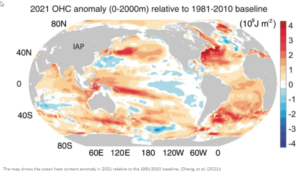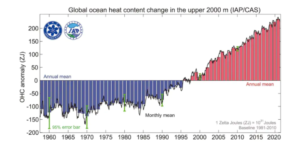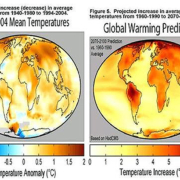Ocean warmth sets record high in 2021; Hawaii in the crosshairs
The warmth of the world’s oceans hit a new record high.
A new analysis, published Tuesday in the journal Advances in Atmospheric Sciences, showed that oceans contained the most heat energy in 2021 since measurements began six decades ago — accelerating at a rate only possible because of human-emitted greenhouse gases.
“When you have this long-term upward trend, you’re getting records broken almost every year, and it’s this monotonous increase,” said John Abraham, a co-author of the study and a professor at the University of St. Thomas in Minnesota.
Data was gathered from a worldwide network of buoys in seven ocean basins.
the team found that ocean waters have been steadily warming since 1958, with each decade warmer than the last. Warming has significantly increased since the 1980s. Over recent decades, portions of the Atlantic Ocean, Pacific Ocean and Indian Ocean have warmed the most.
The longer-term trends brought on by human activity are also overpowering short-term climate fluctuations, such as La Niña and El Niño, which can have regional effects.
“Ocean stores more than 90 percent of the Earth’s net heat gain due to greenhouse gases. Thus, ocean warming is a fundamental indicator of the climate change,” Lijing Cheng, lead author and associate professor at the Chinese Academy of Sciences, wrote in an email. “The record ocean warming in 2021 is strong evidence that global warming continues.”
Global ocean warming is taking its toll
 The 2021 record isn’t surprising, said ocean researcher Linda Rasmussen, who was not involved in the study. Mainly, Rasmussen said, that is because the major driver of ocean warming has not changed. “Because the ocean still absorbs the vast majority of the excess heat, it would be surprising if the trend didn’t continue.”
The 2021 record isn’t surprising, said ocean researcher Linda Rasmussen, who was not involved in the study. Mainly, Rasmussen said, that is because the major driver of ocean warming has not changed. “Because the ocean still absorbs the vast majority of the excess heat, it would be surprising if the trend didn’t continue.”
Last year, the record warmth manifested in several extreme weather events. Warmer water provides more energy, or fuel, for tropical storms, increasing their intensity and longevity. Following a record-breaking 2020 Atlantic hurricane season, 2021 brought another intense stretch of storms.
Hurricane Ida caused intense flooding and thunderstorms, ranking as the fifth-most expensive hurricane on record, with damage estimated at $75 billion. Hurricane Nicholas and Tropical Storms Elsa and Fred also inflicted billions of dollars’ worth of damage.
The increase in ocean heat also raises air temperatures, allowing more moisture to enter the warmer atmosphere. For every 1.8 degrees of warming, heavy rain events will intensify by about 7 percent. 2021 marked one of the wettest years on record for the East Coast, thanks to a slew of tropical storms and summer thunderstorms.
The unusual December tornadoes that struck several states can also be traced to the warm waters. In December, record warm temperatures in the Gulf of Mexico created an atmosphere more reminiscent of spring than winter. As such, two tornado outbreaks occurred in the southern and central United States in the same week.
Marine Heat Waves
“The coastal ocean temperatures that have broken records repeatedly in recent years would not have broken records without the underlying warming trend that has been in place for many decades,” wrote Rasmussen, a retired researcher at Scripps Institution of Oceanography. “Marine heat waves are one of the phenomena that are expected to increase as the ocean as a whole warms.”
 “Ocean warming is destabilizing Antarctic ice shelves from underneath, which could lead to the collapse of large pieces of the ice sheet such as the Thwaites glacier, threatening massive . . . sea level rise,” Michael Mann, a co-author of the study and a climate scientist at Pennsylvania State University, wrote in an email. “This finding really underscores the urgency of acting on climate now.”
“Ocean warming is destabilizing Antarctic ice shelves from underneath, which could lead to the collapse of large pieces of the ice sheet such as the Thwaites glacier, threatening massive . . . sea level rise,” Michael Mann, a co-author of the study and a climate scientist at Pennsylvania State University, wrote in an email. “This finding really underscores the urgency of acting on climate now.”
Also see: https://www.beyondkona.com/hawaii-based-climate-solutions-needed-now/
Surface air temperatures for the past seven years were the hottest on record, with 2020 and 2016 tied for the warmest. Water, however, is much denser than air and holds heat much better than the atmosphere. It takes a much longer time for the oceans to either cool down or heat up, especially given that they cover more than 70 percent of Earth’s surface.
“If you want to know how fast the Earth is warming, you have to measure the oceans,” Rasmussen said. “Since most of the global warming heat ends up in the oceans, we like to say that ‘global warming is ocean warming.’




Leave a Reply
Join the Community discussion now - your email address will not be published, remains secure and confidential. Mahalo.